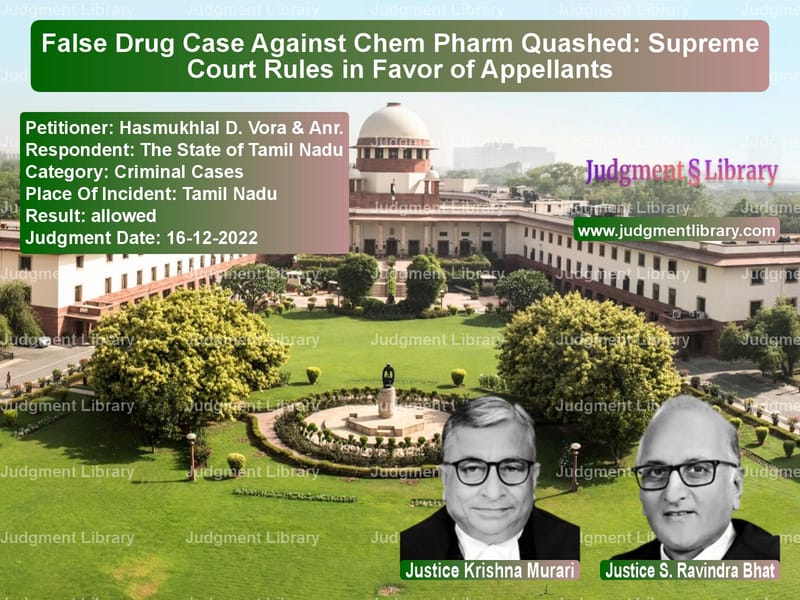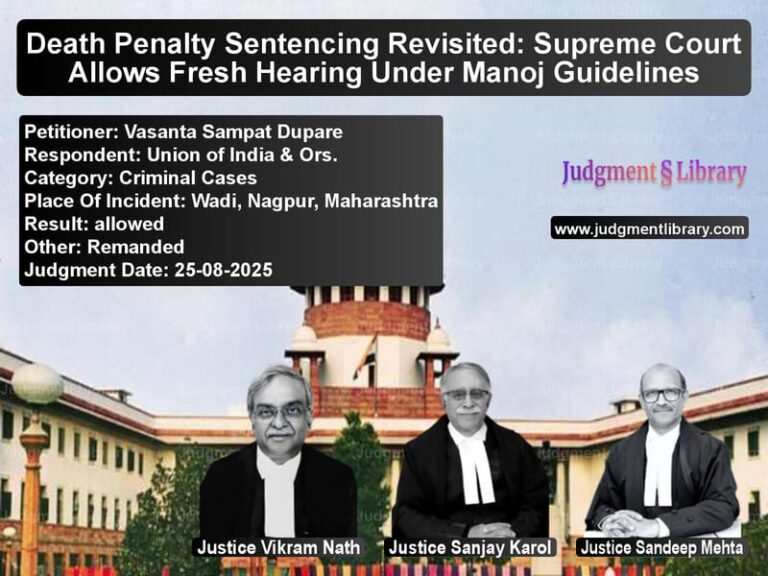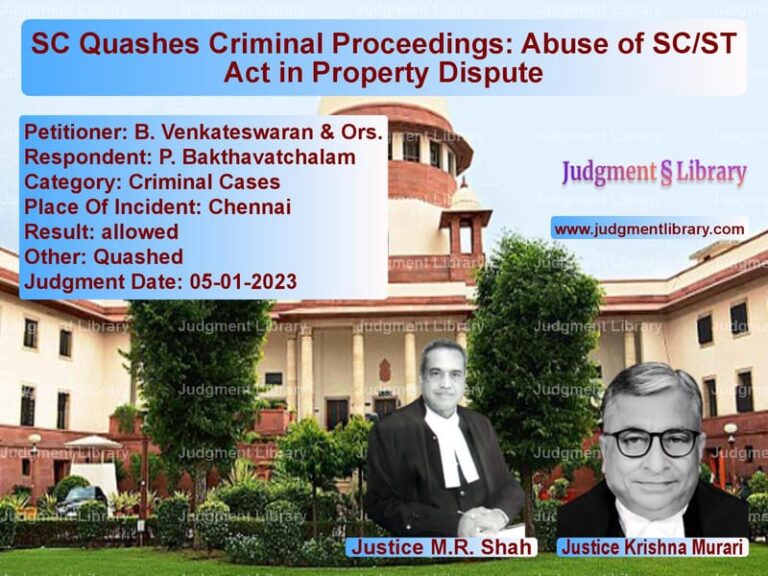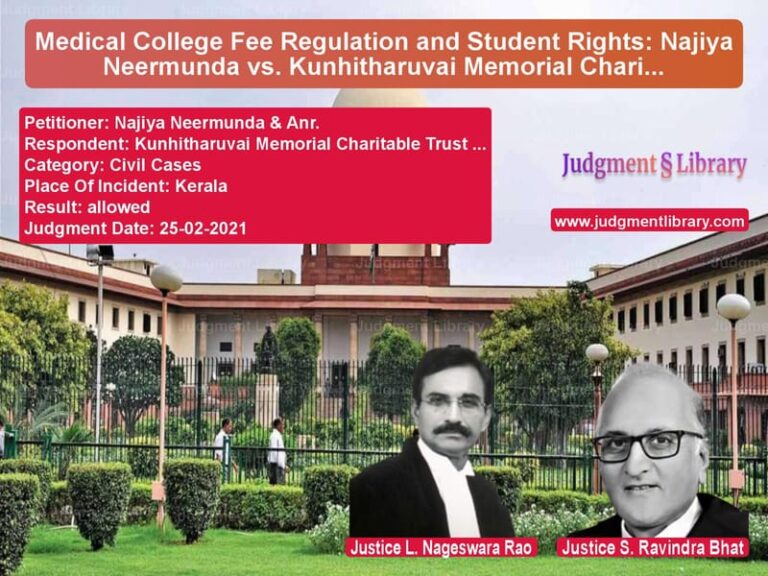False Drug Case Against Chem Pharm Quashed: Supreme Court Rules in Favor of Appellants
The Supreme Court of India recently delivered a significant judgment in the case of Hasmukhlal D. Vora & Anr. vs. The State of Tamil Nadu, where it quashed criminal proceedings initiated against the appellants under the Drugs and Cosmetics Act, 1940. The case involved allegations that the appellants, engaged in the business of selling raw chemical materials, had illegally repackaged and sold pyridoxal-5-phosphate, a substance classified as both a drug and a food additive.
The Supreme Court overruled the judgment of the Madras High Court, which had refused to quash the complaint and had ordered the trial to proceed. The ruling establishes an important precedent for businesses dealing in substances that have dual classifications under different regulatory frameworks.
Background of the Case
The case arose when a drug inspector conducted an inspection of the business premises of M/s Chem Pharm, owned by the appellants, and alleged that they had repackaged bulk quantities of pyridoxal-5-phosphate into smaller packs and sold them without the necessary drug manufacturing license. The key timeline of events is as follows:
- March 19, 2013: The appellants purchased 75 kg of pyridoxal-5-phosphate from M/s Antoine & Becouerel Organic Chemical Co.
- November 19, 2013: The drug inspector conducted an inspection and alleged that the appellants had broken up the bulk quantity and sold smaller packs to various drug manufacturers.
- March 30, 2016: After nearly three years, a show cause memo was issued to the appellants.
- August 11, 2017: More than a year after the show cause memo, a complaint was filed against the appellants.
- August 23, 2021: The Madras High Court dismissed the appellants’ plea to quash the complaint, ruling that the matter required a trial.
- December 16, 2022: The Supreme Court quashed the complaint, holding that the prosecution lacked prima facie evidence.
Arguments by the Appellants (Hasmukhlal D. Vora & Anr.)
The appellants, through their counsel, argued:
- The prosecution failed to prove that pyridoxal-5-phosphate is solely classified as a drug under the Drugs and Cosmetics Act, 1940.
- The substance is also classified as a food additive under the Food Safety and Standards Act, 2006, which exempts it from drug regulations.
- Even if the substance were classified as a drug, the appellants held a valid Wholesale Drug License under Forms 20B and 21B, permitting them to sell bulk drug substances.
- No physical stock of the product was found at the appellants’ premises at the time of inspection.
- There was no scientific or documentary evidence proving that the appellants had repackaged the substance, an act that would require a separate manufacturing license.
- The inordinate delay of over four years between the inspection and the filing of the complaint indicated a lack of substantive evidence.
Arguments by the Respondents (State of Tamil Nadu)
The prosecution, representing the State of Tamil Nadu, countered:
- The appellants had allegedly broken bulk quantities into smaller packs and sold them, constituting an act of manufacturing under the Drugs and Cosmetics Act.
- The complaint was valid and required a full trial to establish whether the appellants had violated drug laws.
- The drug inspector had followed due process in issuing a show cause memo and filing the complaint.
Supreme Court’s Judgment
The Supreme Court quashed the complaint against the appellants, making the following key observations:
- The prosecution failed to provide any evidence proving that pyridoxal-5-phosphate was exclusively a drug and not also a food additive.
- The respondents had made no effort to establish that the appellants had repackaged the substance in a manner that changed its nature, thereby necessitating a manufacturing license.
- The appellants held valid drug licenses under Forms 20B and 21B, allowing them to sell bulk drugs legally.
- The significant delay of more than four years between the inspection and the complaint filing raised doubts about the prosecution’s intent and the credibility of the allegations.
The Supreme Court quoted from State of Haryana vs. Bhajan Lal (1992) to support its ruling:
“Where the allegations in the FIR or complaint are so absurd and inherently improbable that no prudent person can ever reach a just conclusion that there is sufficient ground for proceeding against the accused, the Court should exercise its power to quash the proceedings.”
Key Precedents Cited
The Supreme Court relied on multiple landmark rulings to justify quashing the criminal complaint:
- R.P. Kapur vs. State of Punjab (1960): Laid down the principle that a complaint should be quashed if the allegations do not disclose an offense.
- State of Andhra Pradesh vs. Golconda Linga Swamy (2004): Held that courts should prevent the misuse of criminal law for personal vendettas.
- Bijoy Singh vs. State of Bihar (2002): Stated that unexplained and excessive delays in prosecution weaken the case and can justify quashing.
Impact of the Judgment
This judgment has significant implications for businesses dealing in chemical substances that have dual regulatory classifications:
- It protects legitimate businesses from being wrongfully prosecuted under the Drugs and Cosmetics Act, 1940, when a product is also recognized as a food additive.
- It clarifies that mere repackaging, without altering the nature of the substance, does not amount to manufacturing.
- It reinforces the importance of timely prosecution and the need for substantive evidence before filing criminal complaints.
Conclusion
The Supreme Court’s decision in Hasmukhlal D. Vora & Anr. vs. The State of Tamil Nadu serves as a strong reminder that criminal law should not be misused to harass legitimate businesses. By quashing the case, the Court upheld the principle that prosecution must be backed by clear evidence, particularly when dealing with substances that have multiple uses under different regulatory frameworks.
The ruling ensures that businesses engaged in the sale of bulk chemicals are not subjected to arbitrary legal action without proper investigation. The appeal was allowed, and the criminal complaint was quashed, restoring confidence in legal safeguards for traders dealing in food and drug-related chemicals.
Petitioner Name: Hasmukhlal D. Vora & Anr..Respondent Name: The State of Tamil Nadu.Judgment By: Justice Krishna Murari, Justice S. Ravindra Bhat.Place Of Incident: Tamil Nadu.Judgment Date: 16-12-2022.
Don’t miss out on the full details! Download the complete judgment in PDF format below and gain valuable insights instantly!
Download Judgment: hasmukhlal-d.-vora-&-vs-the-state-of-tamil-n-supreme-court-of-india-judgment-dated-16-12-2022.pdf
Directly Download Judgment: Directly download this Judgment
See all petitions in Legal Malpractice
See all petitions in Drug Possession Cases
See all petitions in Judgment by Krishna Murari
See all petitions in Judgment by S Ravindra Bhat
See all petitions in allowed
See all petitions in supreme court of India judgments December 2022
See all petitions in 2022 judgments
See all posts in Criminal Cases Category
See all allowed petitions in Criminal Cases Category
See all Dismissed petitions in Criminal Cases Category
See all partially allowed petitions in Criminal Cases Category







